Movie Review – Star Trek II: The Wrath Of Khan
After the balls-up that was the first theatrical journey for the crew, Gene Roddenberry was removed from production on the sequel, as it was deemed his fault the first film fared so dismally. Whether this is a correct assumption or not is perhaps not the point, but I think the result of that decision was a good one for the franchise, considering Wrath of Khan’s standing within the fan-bases’ loyalty. Wrath turned out to be a grand adventure and dramatic improvement for the series, much more convincing than it’s immediate predecessor, and reinvigorated the franchise overall. While the film cannot be said to have no faults, the end result is a sharp improvement.
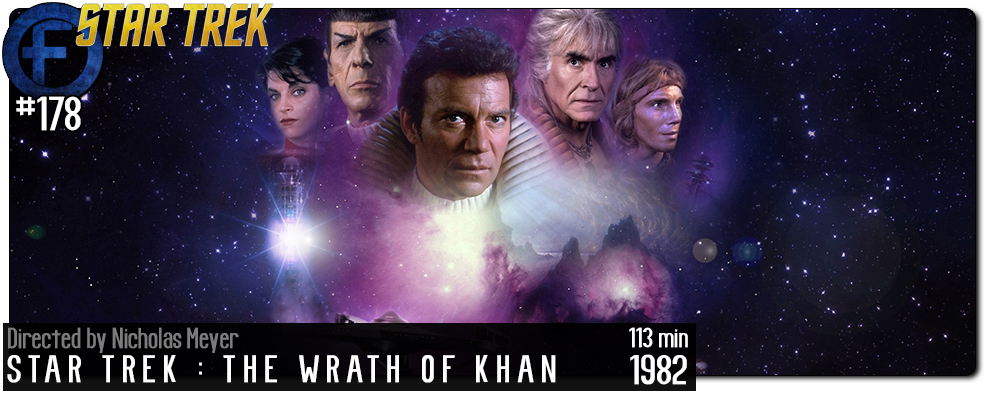
Cast : William Shatner, Leonard Nimoy, DeForest Kelley, Ricardo Montalban, James Doohan, Kirstie Alley, Nichelle Nichols, George Takei, Walter Koenig, Bibi Besch, Merrit Butrick, Paul Winfield, Kirstie Alley, Judson Scott.
Synopsis: An old enemy returns to seek vengeance on Kirk, as the mysterious Genesis Project comes to fruition in events that change Kirks life forever.
******
Classic return to form for the Star Trek crew, after their initial outing theatrically had bombed with the critics. This time round, Kirk and Co must face off against a vengeful enemy they’ve previously encountered, Kahn, a superhuman from Earth who, at one time, had been exiled for his tyrannous behaviour. In a pivotal event, Kirk meets his previously unknown son, David, who it turns out is a scientist developing something known only as the Genesis Project. Khan, seeking revenge against Kirk for what he perceives as the Captain’s responsibility for the death of his own wife, pursues the Enterprise crew across the galaxy in a power play that will have lasting impact on Kirk and the crew of the famed ship.
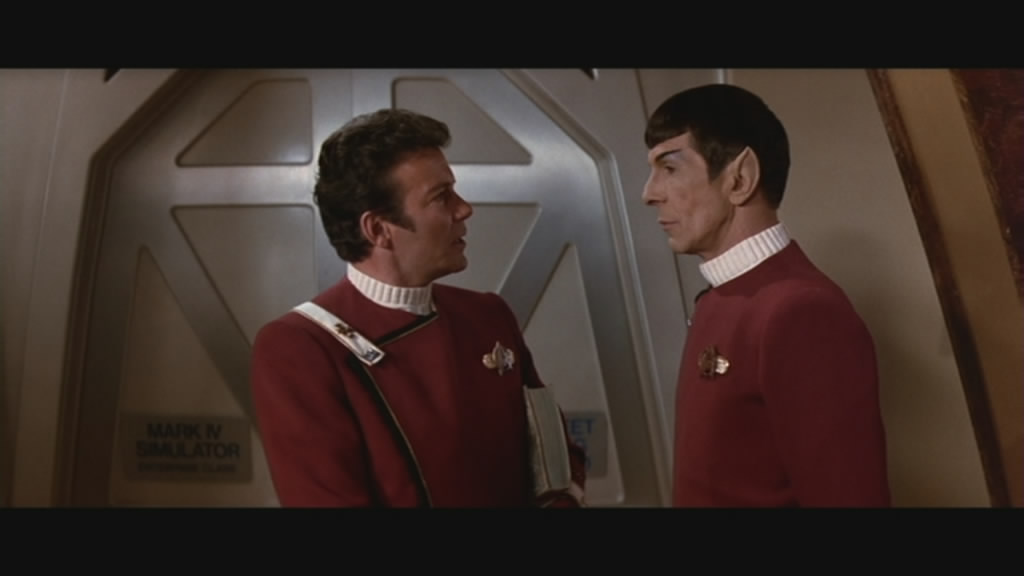
After the balls-up that was the first theatrical journey for the crew, Gene Roddenberry was removed from production on the sequel, as it was deemed his fault the first film fared so dismally. Whether this is a correct assumption or not is perhaps not the point, but I think the result of that decision was a good one for the franchise, considering Wrath of Khan’s standing within the fan-bases’ loyalty. Wrath turned out to be a grand adventure and dramatic improvement for the series, much more convincing than it’s immediate predecessor, and reinvigorated the franchise overall. While the film cannot be said to have no faults, the end result is a sharp improvement.
As the film begins, we see Kirk involved in training up and coming recruits in the famed Kobayashi Maru scenario in battle: what do you do in an un-winnable situation? Newcomer to the Trek pantheon, Lieutenant Saavik (Kirstie Alley in her film debut) seems unable to grasp the situation, and the scenario ends with her successfully killing all her fellow officers. Kirk, striding through the ship with the depressing sense of finality, bemoans to Spock that he’s just about over the whole adventure through space lark…. or is he? The theme of age and ability is shoehorned into the script here, with Kirk beginning to feel the onset of age and responsibility as he slowly loses command of his Enterprise to bureaucracy.
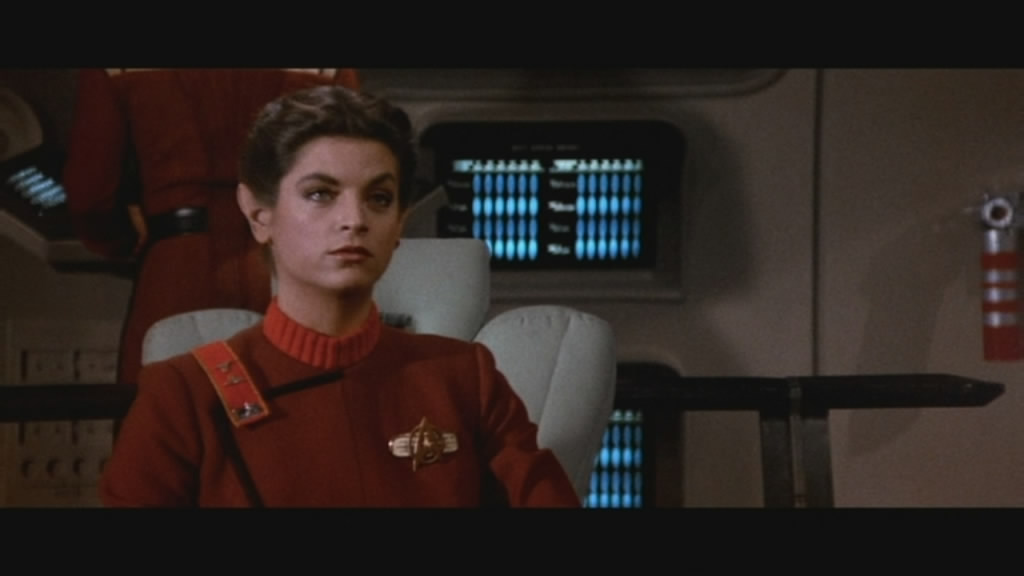
Fortunately for Kirk and the crew, arch-nemesis Khan makes an appearance, capturing Chekov and a fellow officer who happen to be in command of the USS Reliant, which is involved in terraforming new planetoids, when they beam down to the surface of a susceptible entity. No amount of bargaining with Khan will dissuade him from his mission: to steal the Genesis Project and annihilate Kirk, no matter who or what gets in his way. Kirks former lover Carol Marcus (Bibi Besch) is working on the Genesis Project with her son, David (Merrit Butrick) when Khan shows up and steals it. her garbled message to Kirk, the only person she trusts to rescue her, spurs the newly promoted Admiral into action, and he takes the Enterprise off on a rescue mission.
This is, of course, all part of Khan’s plan. The Genesis Project is a newly made technology that is able to rapidly form, and habitate, new planets from old. Being able to form the very essence of life itself is a power Khan wants for his own ends, and most of all, they have nothing to do with preserving life. Khan and his cronies, all of whom are superhuman and more than a match physically for Kirk and Co, yet they still manage to underestimate the great man’s intelligence in battle. The scenario of potential catastrophe for the Enterprise is averted with the ultimate sacrifice from Spock, who manages to get the Enterprise’s warp engines on line after a prolonged battle, just before he expires.
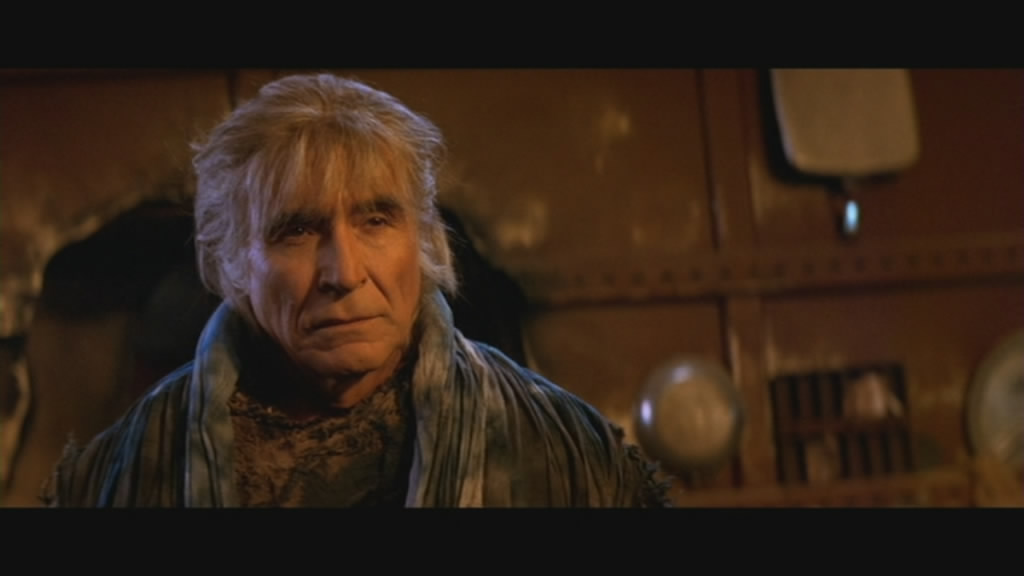
Wrath Of Khan, and to some extent, the immediate sequel The Search For Spock, all deal quite heavily with the death of major characters in the series, or at least the apparent death of them. Spock’s death in particular hits Kirk hard, and we see this in the films final, poignant moments, where no doubt those who watched this at the time of it’s release were unaware of the impending resurrection in the next film. It’s a solid tear-jerker from Kirk and the crew, all upset at the loss of their valiant comrade.
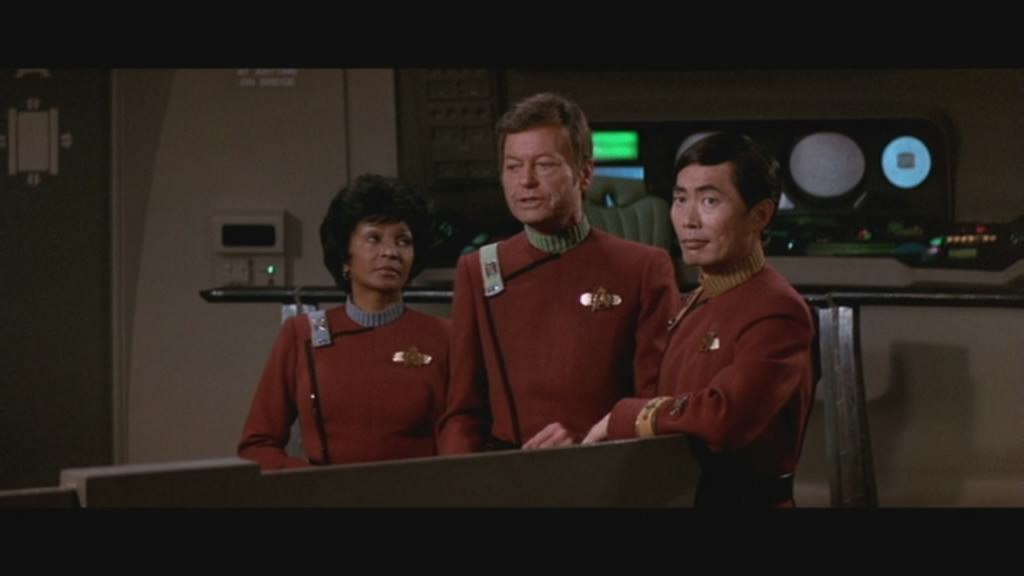
While perhaps a little more conventional in it’s narrative than the previous film, Wrath Of Khan never feels like an extended TV episode, something I guess it had the potential to do since the filmmakers were essentially bringing back a previously defeated TV episode villain. Director Nicholas Meyer, who apparently rewrote the script in 12 days once he had signed on to direct, brings to the screen a fairly adequate sense of scale and adventure, although a largely bland opening stanza makes way for terrific, taut and exciting climax later on. What I enjoyed about Wrath of Khan was the lack of adherence to the expectations of the franchise’s conventions: the storytelling is first rate, developing the sense of increasing hatred of Khan, and the nonchalant arrogance of Kirk. Of course, this arrogance is tempered with a vast experience, and you just know that when he’s faced with Khan, Kirk will triumph regardless of the cost, both personally and physically. Kirk, of course, is Kirk. And we get to see something as yet unheralded in the series: Kirk with a serious relationship under his belt, in the form of his ex-lover Carol, and her son, David. David, who most people will know now as Kirks own son (although he is unaware of it until the films final act), becomes a crystallising force in Kirks motivations in both this film, and the next one. By giving Kirk a sense of purpose within the film, and within himself, Meyer and his team managed to bring something to the character that, as far as I know, never been managed before; a sense of empathy and depth. Kirk is truly human here, his soul laid bare as he contends with Khan and the fact that his own flesh and blood is now in peril. Until now, Kirk has never felt the icy touch of family members in peril, and how he deals with it is fascinating.
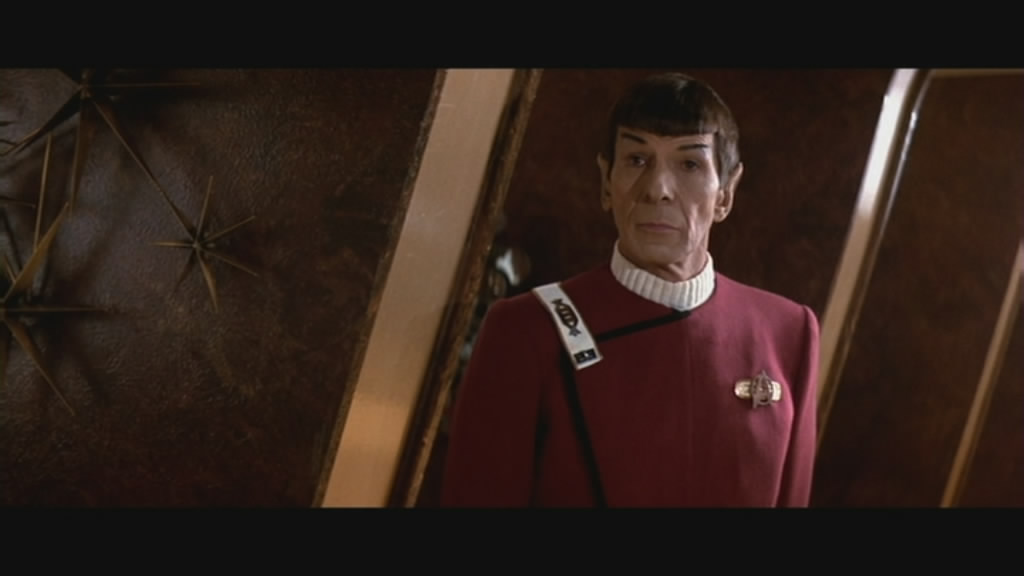
William Shatner and Ricardo Montalban are both terrific in their roles, Shatner especially so, thanks to a great script to work with. Montalban gives it his all, his ferocious Khan a truly behemoth villain for the Enterprise crew to triumph over. The rest of the cast, including Kirstie Alley, are good, solid support in their roles, and you cannot fault the performances in this regard. The film is, as mentioned earlier, a little flat in the opening stanza, a sense of overawed ponderousness almost capitulating to the franchise’s massive legacy, yet Meyer brings it up a notch when the plot starts to thicken, and Khan’s plans begin to unravel to their dramatic conclusion. The action is fairly solid in the end, and you’ll be cheering for Kirk and Co by the time Khan learns that he’s about to fail his mission.
Special mention must be made of the then-revolutionary special computer effects used in the film, when the Genesis Probe is unleashed to generate the first planet in it’s history. The effects may look dated by today’s standards, but for their time were cutting edge. The rest of the films general effects, from model shots to rotoscoping to hand-drawn animation, are typically good for a film of this era (1982) and again, may have dated by comparison to stuff Hollywood produces today.
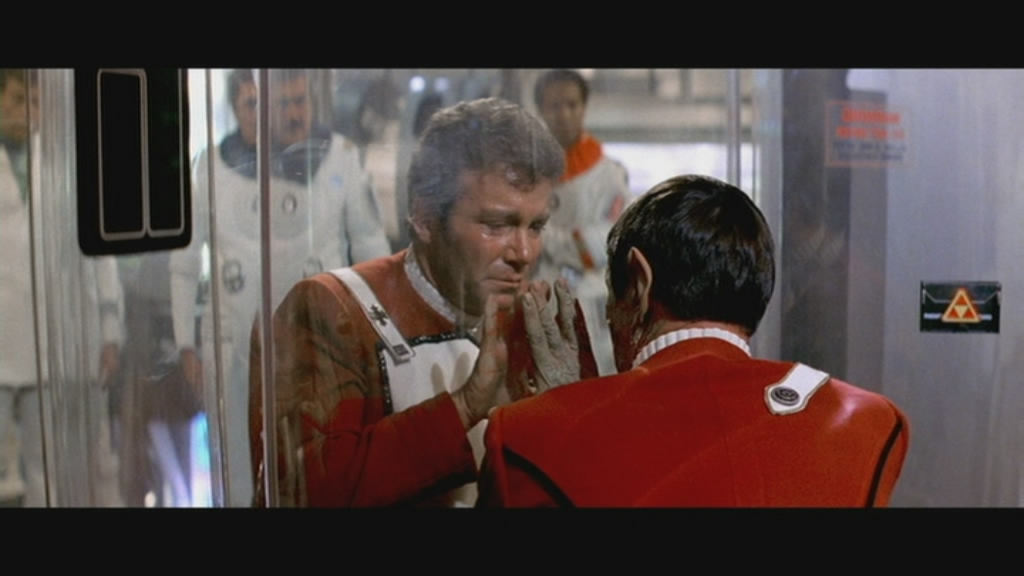
For me, though, it’s the films tragic denouement that requires the most attention. Regardless of your affiliation for Trek, be you a casual fan, a non-believer, or a die-hard Trekkie (“Trekker” can kiss my warp drive ass!) you cannot help but be touched by the friendship between Kirk and Spock, achieved over decades of television reruns to the point that it’s permeated the very consciousness of our culture. To see Kirk watching his friend die, in such a helpless fashion, is heart-rending, and I can only imagine how it must have been for fan’s witnessing this for the first time. Kirks face, so dramatically performed by Shatner, is filled with sorrow and sadness, a sadness so profound it echoes back to the beginnings of the original series, these men have been friends for almost their entire lives, and now, Kirk can do nothing as Spock collapses and dies from the Enterprises radiation. The wall of glass (at least, I think it’s glass.. It could be some kind of pseudo-scientific protective alloy) is all that separates Kirk from the Vulcan, the famous split-fingered gesture of Spock’s slowly, slowly, disappearing from view as the man dies.
There is a sense of devastation about the event, the post-Khan defeat resolution that ends the film, on what has to be said is a fairly sombre note. Yet not all is lost: for as his body is shot out into space onto the newly formed Genesis planet, Leonard Nimoy’s distinctive voice comes over the soundtrack, and finally, before the credits, we get the sense that he is not totally gone. Reciting the famous lines “..to boldly go where no man etc etc..” is enough to make us think that, perhaps, he’s not lost to us. Only time would tell if our thoughts were well founded.
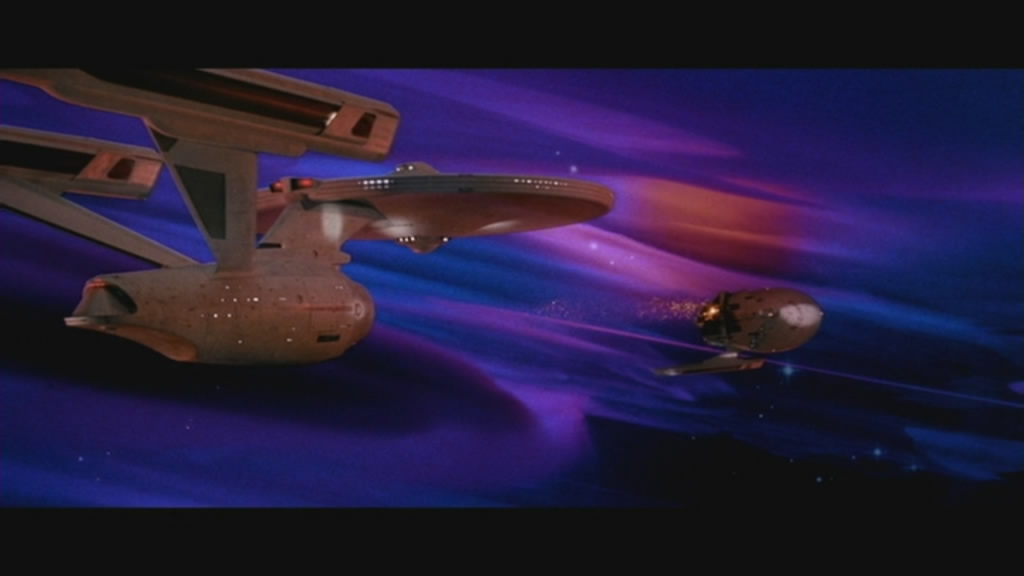
Taking over music duties with Wrath of Khan is James Horner, who has some serious shoes to fill after Jerry Goldsmiths sterling effort in the original film. Horner produces some wonderful score here, his lavish, full blooded action music perfectly counterpointed by some truly tender, moving motifs during the quieter moments. The Trek themes are present, and used well, and as far as dynamic scores go for films, this would be right up there among the best of them. Horner may be lambasted by modern audiences for his “anvil clanking” style (see the score for Aliens as an example of that) but here, he’s managed to not only take Goldsmiths themes and run with them, but perhaps even improve upon them as well. And that’s no mean feat.
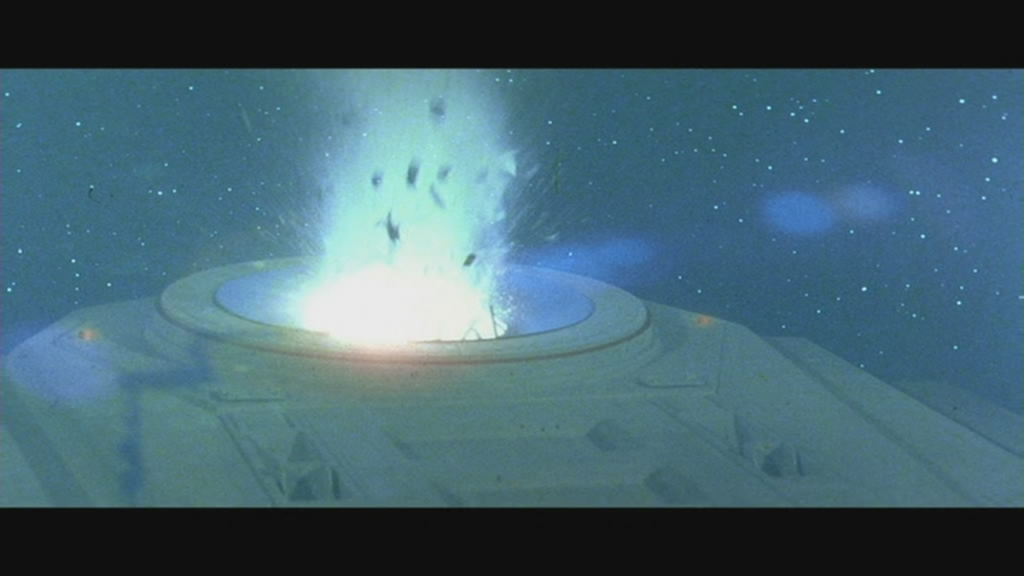
Star Trek II: The Wrath Of Khan is a great Trek film, one of the better ones in the long history of the franchise. It’s easy to enjoy, filled with genuine pathos and drama, and above all, character development, and even if you don’t understand the whole Trek “thing”, this is still a thoroughly enjoyable cinematic ride.
